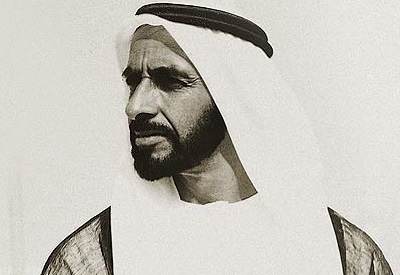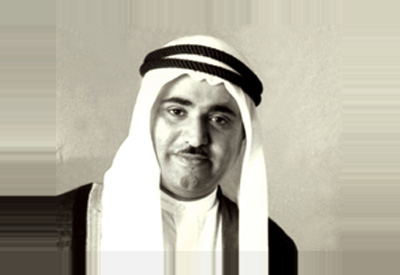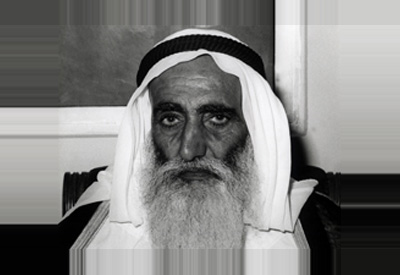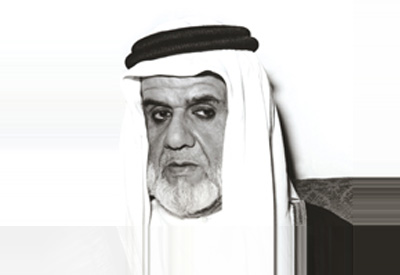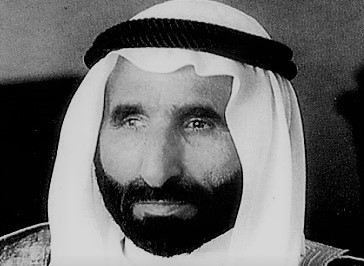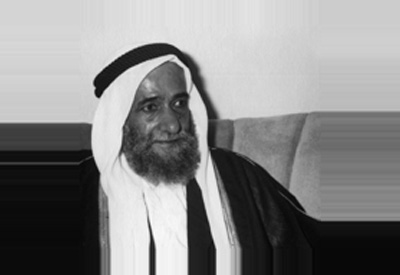Founders of the Union
This page provides brief biographies of the then sheikhs of the seven emirates that co-founded the UAE.
Abu Dhabi
Known as the Father of the Nation for his role in forming the United Arab Emirates, the late H. H. Sheikh Zayed bin Sultan Al Nahyan was the first President of the UAE. He served this position since the formation of the UAE on 2 December 1971 until he passed away in 2004. He also served as the Ruler of the emirate of Abu Dhabi from 1966 to 2004.
Born in the city of Al Ain, Sheikh Zayed was the youngest of the four sons of H. H. Sheikh Sultan bin Zayed Al Nahyan, Ruler of Abu Dhabi from 1922 to 1926.
Sheikh Zayed was a good listener and an unbiased dispute mediator. He was also renowned for his patience, vision and wisdom; qualities that earned him the title of ‘the wise man of the Arabs’.
He ensured that all UAE citizens are instrumental to the nation's collective success. His vision led the UAE to be the GCC’s second biggest economy after KSA, the third largest in the Middle East and according to many prestigious international reports, the most important financial and economic centre in the region.
Read ‘Eternal Legacy’, a book containing 100 quotes by Sheikh Zayed translated into 5 international languages.
Sheikh Zayed’s social and political endeavours
Sheikh Zayed understood that in order to build harmony, cohesion and solidarity amongst his people, he first needed to build their trust through constructive and personal interaction. He enjoyed getting out and meeting the local community, and was considered as a man of the people. Through the late 1920s and 1930s, Sheikh Zayed spent considerable time in the desert, living alongside Bedouin tribesmen and learning about their way of life.
In 1946, he was appointed as the Ruler’s representative of the Eastern Region. Immediately after his appointment, he was involved in government affairs in Al Ain city, the region’s administrative seat.
Following his success at initiating the development of Al Ain city during the 1950s, Sheikh Zayed succeeded his elder brother as Ruler of Abu Dhabi on 6 August 1966.
As a political leader, Sheikh Zayed believed that the resources of the country should be fully used to the benefit of all the people of UAE. He promptly increased contributions to the Trucial States Development Fund and with revenues growing as oil production increased, Sheikh Zayed undertook a massive construction programme building schools, houses, hospitals and roads.
Sheikh Zayed’s role in establishing the UAE
The process of establishing the Federation started with the late Sheikh Zayed paving the way towards a unity to ensure the Trucial States’ survival and at later stages to enforce the federal authorities when faced with serious threats.
On 16 January 1968 after the announcement of British withdrawal from east of Suez and the Gulf, Sheikh Zayed established closer ties with the other emirates. He went immediately to Dubai to discuss the next steps with the then Ruler of Dubai, the late Sheikh Rashid bin Saeed Al Maktoum.
On 18 February 1968, both Sheikhs concluded an agreement on a federation between them, and called for a Federation that would include not only the seven emirates that made up the Trucial States, but also Qatar and Bahrain.
Three and a half years later, with the close of British withdrawal, Sheikh Zayed again engaged Sheikh Rashid and the other Rulers in the Trucial States in the decisive discussions, which determined the essential nature of the UAE.
While Sheikh Zayed’s enthusiasm was a key factor in the formation of the UAE, he also won support for the way in which he sought consensus and agreement among his fellow Rulers.
Eventually, six emirates (except Ras Al Khaimah) followed Sheikh Zayed in establishing the UAE, which formally emerged on the international stage on 2 December 1971. The Rulers of the other emirates unanimously elected Sheikh Zayed as the President of the UAE. Ras Al Khaimah acceded to the new federation on 10 February 1972.
Sheikh Zayed’s contributions at the GCC level
The late Sheikh Zayed was a leading force in the foundation of the Gulf Cooperation Council (GCC). His vision was to bring together the Gulf countries that shared similar economies and common tribal social structures.
Ultimately, he succeeded in establishing a formal regional and political entity. The Charter of the Council was signed on 24 May 1981 in Abu Dhabi by the heads of its member states: Bahrain, Kuwait, Oman, Qatar, Saudi Arabia and the United Arab Emirates.
Sheikh Zayed in the Arab world
Sheikh Zayed believed in solidarity and cooperation amongst all Arab countries. He felt it was his duty to use his personal and political authority in both the Arab and the international arenas to achieve peace and progress in the Middle East.
He supported Egypt and Syria in their 1973 war for the liberation of the Arab Occupied Territories in Palestine by imposing an oil boycott, making his famous declaration: “Arab oil is not dearer than Arab blood.”
All Arab leaders held Sheikh Zayed in high regard, enabling him to act as a mediator on more than one occasion.
Sheikh Zayed’s international contributions
Sheikh Zayed laid the foundations of a foreign policy, which is characterised by wisdom, moderation, balance, support for truth and justice, and maintaining a language of dialogue and understanding.
This balanced foreign policy has become a hallmark of the UAE, both regionally and internationally.
He has also earned a reputation as an international humanitarian and philanthropist, supporting a number of causes across the world and again setting an enduring legacy.
Sheikh Zayed passed away in 2004, in his late eighties, leaving behind a legacy as the Father of the Nation. The principles and philosophy that he brought to government, however, remain at the core of the UAE and its policies today.
Sourced from:
- The late Sheikh Zayed bin Sultan Al Nahyan- Crown Prince Court
- Sheikh Zayed bin Sultan Al Nahyan, Founder of the UAE – Embassy of the United Arab Emirates in the USA
Dubai
The late H. H. Sheikh Rashid bin Saeed Al Maktoum could be called as the first visionary of the modern UAE. It was during his rule that Dubai grew from a small trading town into a major cosmopolitan city.
Sheikh Rashid was born in Dubai in 1912, the same year as his father Sheikh Saeed Al Maktoum became the Ruler of Dubai. He attended the Al Ahmadiya School; his studies included Islamic studies, Arabic and arithmetic.
As the first-born son of Sheikh Saeed, Sheikh Rashid involved himself at an early age in the politics of the emirate. He frequently attended his father's Majlis; ever curious, he would listen attentively to each man's problem or opinion.
Eager to comprehend the precise details of governance, he spent long hours asking questions to his parents about the events of the day.
Sheikh Rashid had exceptional leadership attributes and abilities. He helped his father in all fields; especially the economic affairs.
On 10 September 1958, his father Sheikh Saeed passed away. Sheikh Rashid succeeded him and become the Ruler of Dubai in October the same year.
Sheikh Rashid’s enthusiasm to put his birthplace on the world map was as boundless as his love for his people. His foresight, wise decision-making and willingness to listen to the opinions of his people, whether they were representatives of influential families or common people, are well documented.
The UAE witnessed a significant amount of construction activity in the 1970s, most of which was in Dubai.
Sheikh Rashid's participation in the Trucial States Council played a significant role in preparing for the formation of the Union. He worked with Sheikh Zayed to issue the Union Accord between Dubai and Abu Dhabi in February 1968.
In 1971, he with late Sheikh Zayed pioneered the efforts that led to the UAE's formation in December 1971. where he was appointed as the Vice-President, and as Prime Minister of UAE in 1979.
Sheikh Rashid encouraged democracy and quoted: “Every citizen in this country has the opportunity to express their opinion frankly and clearly and to criticise the government as well.”
Related links
- Ruling family in Dubai – the official website of Sheikh Mohammed bin Rashid Al Maktoum
Ajman
The late H. H. Sheikh Rashid bin Humaid Al Nuaimi was the Ruler of Ajman for 54 years, beginning in 1928 as the ninth ruler of the emirate.
Since the age of eight, Sheikh Rashid started to acquire the skills of leadership from his father, who ruled the emirate since 1910.
Sheikh Rashid brought a renaissance that led to the prosperity of the emirate. Under his leadership, Ajman became the first emirate to issue its own passports.
In 1958, Sheikh Rashid formalised an education system in the emirate, which had until that time relied on volunteering teachers and traditional methods.
He established the Ajman Police Department in 1967.
Some of his other initiatives were:
- establishing a science institute
- adopting civil and Islamic jurisprudence
- providing free health care
- creating an electric grid and network of water pipelines
Umm Al Quwain
The late H. H. Sheikh Ahmed assumed his position as the Ruler of Umm Al Quwain in 1928. It is believed that he was 18 when he became the Ruler.
Sheikh Ahmed acquired the experience of ruling the country and his people from his father H. H. Sheikh Rashid Al Mualla, who ruled Umm Al Quwain for almost 25 years. During Sheikh Ahmed’s rule, the emirate enjoyed great stability despite its limited resources.
He established the first school and hospital in Umm Al Quwain, had the emirate's first roads paved and built a police and public security department. He was a great figure who worked for the betterment of his citizens.
Ras Al Khaimah
The late H. H. Sheikh Saqr bin Mohammed Al Qasimi took over as the Ruler of Ras Al Khaimah on 17 July 1948.
During Sheikh Saqr's reign, he established security and peace in the emirate and provided a decent life for his people. He established many schools including the emirate's first girls’ school in 1956.
At the time of creating the Federation, Sheikh Saqr had many concerns; one of them was about getting the emirate’s islands of Greater and Lesser Tunbs which Iran had seized. However, he received assurances that the new Federal Government would continue to claim it. Finally, Ras Al Khaimah joined the federation on 10 February 1972.
Fujairah
The late H. H. Sheikh Mohammed bin Hamada Al Sharqi ruled Fujairah from about 1937 to 1974. He believed in a separate identity of Fujairah, which was finally acknowledged by Britain in 1952.
People looked up to him as a ray of hope and inspiration. He formalised the Sharia court system. In 1969, he initiated road construction and started the emirate's first books’ library.
Some of his other initiatives include:
- setting up the first primary school, which opened in 1961 with 90 students
- establishing a deal with the British in 1965 to create an airport
- setting up the first dispensary, opened in 1969
Related links
- The Founding fathers- National Library and Archives


